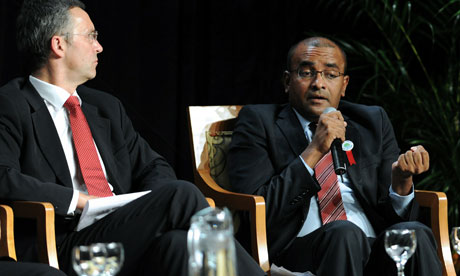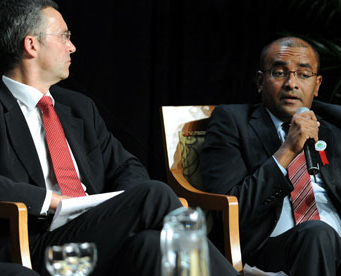President Bharrat Jagdeo on Wednesday complained in front of Norway’s Prime Minister that Guyana was still to get the first tranche of US$30M from a forest protection deal clinched over a year ago.
The president was speaking at a forum on the sidelines of the ongoing climate change summit in Cancun, Mexico. The UK Guardian reported yesterday that while Norwegian Prime Minister Jens Stoltenberg told his audience that his country’s forest protection initiative was going “quite well” Jagdeo railed about what he said had been a “nightmare”.
“It’s a nightmare. It is a test of the sincerity of the developed world, and the delivery on development assistance has been abysmal,” Jagdeo told the forum. He noted that the first tranche of US$30M from a potential US$250M deal to protect Guyana’s forests has still not been made available by Oslo.
He said this was even though Guyana had met conditions demanded by Norway. While not a Mexican stand-off the exchange between the two leaders was uncomfortable.
“We have not seen a single cent expended as yet on the projects that are so vital to transformation.” There was a burst of applause. Stoltenberg, who had been staring hard at Jagdeo during his speech, did not join in, the Guardian blog reported.

As Norway saw it, the US$250m it had pledged to preserving Guyana’s forests was providing a model for how to tackle climate change. If there were delays in disbursing to Guyana, Stoltenberg suggested it was due to Norway’s insistence on “results-based financing”.
A fund has been set up under the auspices of the World Bank to handle disbursal of the first Norwegian tranche of US$30M.
For Jagdeo, the Guardian blog said, the programme was turning into a political disaster that could cost him the presidency. Efforts to secure the money led to meetings where Norwegian and Guyanese officials were outnumbered by dozens of World Bank bureaucrats.
“It’s this bureaucracy that we have. The structure is so complicated that everything gets bogged up – even the tiniest projects,” Jagdeo later told the Guardian in an interview. “You have to jump through hoops.”
He said the process was “humiliating”. He told the Guardian it also carried political risks, for rich as well as poor countries if leaders were unable to demonstrate progress.
“Countries like mine run a risk,” said Jagdeo. “Somehow people only think that a developed country has political capital to expend, like President Obama. But we in poor countries have political capital too”, the Guardian quoted him as saying.
It hadn’t been entirely without political risks for Norway either, Stoltenberg said. He said it had been difficult to persuade Norwegian voters in the depths of a recession that forest projects were in their interest. “It’s hard to win elections on a message of high taxation,” he said. “We won election last year but you never know, elections are uncertain things.”
However, the Guardian blog said there was one element on which the entire panel could agree: developed and developing countries needed to craft their forest conservation and development projects with extreme care.
As Jagdeo said: “If you can’t get it right with the country that you have been working at this for a while and that has all the political will in the world, those who are sitting on the fence now will be looking at the problems we are facing and saying: ‘we don’t want to go there’.”
Mechanics
Meanwhile, Jagdeo urged the Cancun Climate Change Summit to make progress on addressing deforestation and forest degradation and the mechanics of a green fund to help invest in mitigation and in adaptation to help the most vulnerable.
President Jagdeo acknowledged that the forum was insufficient to secure a global, legally binding climate agreement but highlighted other areas for action such as technology transfer and financing.
He was delivering his address on Wednesday at the 16th Conference of the Parties (COP) of the United Nations Framework Convention on Climate Change (UNFCCC), where he said that translating negotiating positions into meaningful collective action was long overdue.
The president said ultimately it was “a question of sincerity” and in that light he threw out the challenge to set out a “specific path to achieve a legally binding agreement,” according to a copy of the text of his address.
And in his view, he asserted that the “defining test of international sincerity” was whether the developed world was really committed “to provide immediate action on financing for the developing world.”
Jagdeo told the summit that “it would be a mistake of profound historical consequence if this test of sincerity was failed by those who pledged to provide the financing.”
According to the Guyanese Head of State, “if individual members of the developed world cheat even on the financing commitments of the Copenhagen Accord, they will send a disastrous signal that they are not up to the challenge of defeating climate change. The potential for progress will rapidly dwindle, and those of us who have expended extensive political capital in trying to mobilise public support for action on climate change will see that support retreat.”
And most immediately, Jagdeo declared, there must be a stop to what he termed “the re-packaging of existing aid commitments as part of the US$30B that was promised for the period 2010-2012.”
“If the US$30 billion promised at Copenhagen for the period 2010 to 2012 starts to resemble the kind of dubious accounting that created the financial crisis, then it will worsen, not help solve, the climate crisis,” Jagdeo cautioned.
He also drew attention to a recent report by the United Nations Environment Programme which showed that even with the upper end of the commitments in the Copenhagen Accord, countries are a long way off delivering against the set of commitments regarding annual emissions by 2020.
Meanwhile, Jagdeo noted that the low carbon revolution can lift billions in the developing world out of poverty and pointed to South America “where our countries are leading the way towards this low carbon future,” in addition to the stewardship of the Amazon and other forests which provide the world with its largest climate utility.
He also highlighted Guyana’s Low Carbon Development Strategy as one which combines the preservation of the country’s 16 million hectare forest with a re-orientation of its economy onto a low carbon trajectory.





